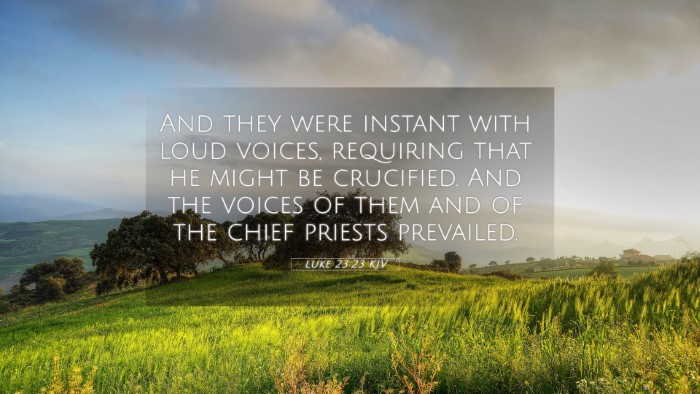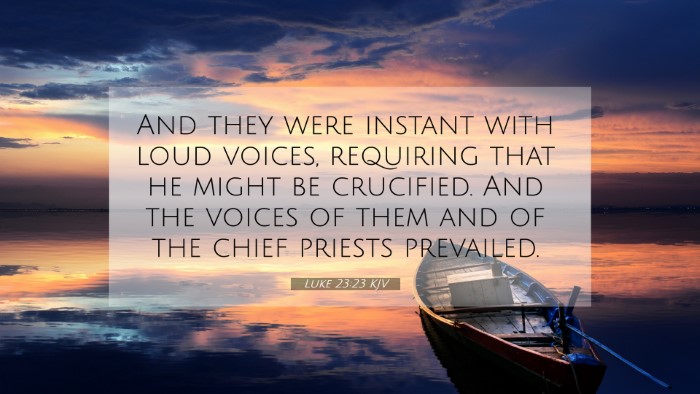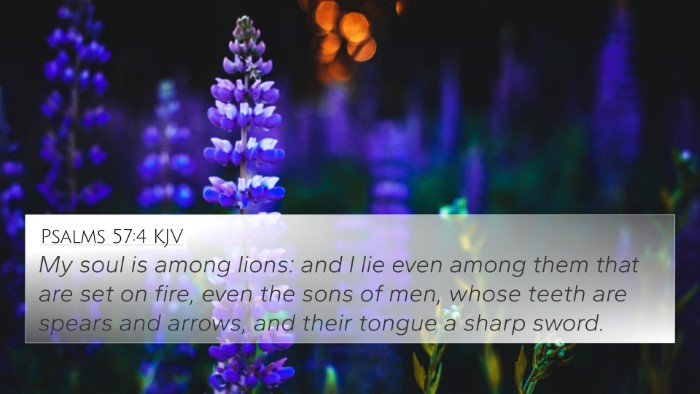Understanding Luke 23:23
Luke 23:23 records the response of the crowd during the trial of Jesus, proclaiming "But they were insistent, demanding with loud voices, 'Crucify Him!' And their voices prevailed."
Summary of Verse Meaning
This verse illustrates the intense pressure exerted by the crowd to condemn Jesus, showcasing the height of opposition against Him. The insistence of the crowd signifies a larger narrative of rejection, while highlighting the fulfillment of prophecy surrounding the Messiah's suffering. Commentators emphasize the moral and spiritual implications of collective decision-making and the rejection of God's plan through their clamoring for violence.
Insights from Public Domain Commentaries
Matthew Henry
Henry's Insights: In his commentary, Matthew Henry elaborates on the sinfulness of the crowd's request. He explains that the loud voices of the people indicating their readiness for violence reflect not only their personal animosity towards Jesus but also the blindness of their hearts. Henry emphasizes that the cries for crucifixion were an embodiment of the sinful nature of humanity, illustrating the rejection of truth by those who were deceived.
Albert Barnes
Barnes' Insights: Albert Barnes provides a historical context to the verse, suggesting that the clamoring crowd represents a politically driven mob emotion rather than a canonical decision. He notes that the ‘loud voices’ signify how public opinion can often sway justice, making the event a cautionary tale of mob mentality that ought to resonate in contemporary society as much as then.
Adam Clarke
Clarke's Insights: Adam Clarke draws attention to the spiritual ramifications of the scene. He speaks to the fulfillment of divine will through the actions of sinful man, asserting that even in their rebellion, God's sovereignty remains intact. Clarke also mentions how this moment connects with the broader narrative of redemption, as it leads to the necessity of the atoning sacrifice of Christ.
Cross-References and Thematic Connections
Luke 23:23 serves as a pivotal moment in the crucifixion narrative and can be connected to several other verses that elucidate its meaning. Below is a list of cross-references:
- Isaiah 53:3: "He was despised and rejected by men." - Foretelling the Messiah's rejection.
- John 19:15: "They cried out, 'Away with Him! Crucify Him!'" - A parallel cry from the crowd in John's Gospel.
- Matthew 27:23: "Why, what evil hath he done?" - Pilate's inquiry amidst the mob's wishes.
- Mark 15:13: "And they cried out again, 'Crucify Him!'" - The consistent demand for crucifixion across the Gospels.
- Acts 2:23: "This man was delivered over to you by God's set purpose and foreknowledge; and you, with the help of wicked men, put Him to death." - A reflection on divine purpose amid human actions.
- Matthew 5:11: "Blessed are you when people insult you and persecute you..." - Jesus's teachings about the persecution of the righteous.
- Luke 18:32: "For He will be handed over to the Gentiles..." - Jesus foretold His fate, affirming the events unfolding in the trial.
- Hebrews 12:2: "Looking to Jesus, the founder and perfecter of our faith..." - Emphasizing the obedience of Christ amidst rejection.
- 1 Peter 2:23: "When he was reviled, he did not revile in return..." - Discussing Christ's response to the accusations able to connect to this narrative of rejection.
- Luke 22:37: "For I tell you that this Scripture must be fulfilled in me..." - Jesus' acknowledgment of the necessity of His suffering, linking back to the prophetic fulfillment and the crowd's passion.
Conclusion
Luke 23:23 presents a stark glimpse into human nature's tendency to forsake righteousness for the sake of conformity and the power of the crowd. The insights from prominent commentators like Matthew Henry, Albert Barnes, and Adam Clarke help illuminate the theological significance of this moment within the grand narrative of Scripture. By examining cross-references, one can see the broader implications of Jesus' rejection and how it fits into the fulfillment of the messianic prophecies, encouraging deeper reflection and analysis of the interconnectedness of Biblical texts.
The Importance of Cross-Referencing in Biblical Studies
Understanding verse meanings in the Bible often requires examining cross-references that reveal thematic connections across the Scriptures. Cross-referencing not only aids in interpretation but enriches the reader's comprehension of Biblical narratives. Utilizing tools for Bible cross-referencing, such as a Bible concordance or a Bible cross-reference guide, is essential for anyone seeking to explore the depths of biblical text relationships.






